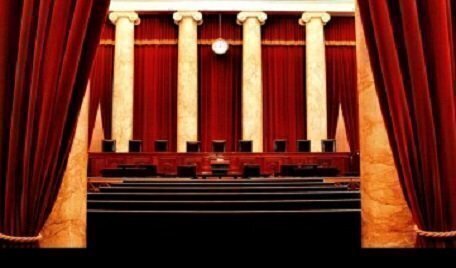Anthony Kennedy’s career on the Supreme Court bench was marked by several important decisions as the court’s swing vote. But none were as high profile as Kennedy’s decisions in four major gay-rights cases.
 On May 20, 1996, the Supreme Court issued an early landmark decision supporting the right of gays under the Constitution to seek protection from discrimination. Justice Kennedy wrote the majority decision in Romer v. Evans, starting his prominent role in future decisions that affected the constitutional rights of lesbian, gay, bisexual, and transgender people.
On May 20, 1996, the Supreme Court issued an early landmark decision supporting the right of gays under the Constitution to seek protection from discrimination. Justice Kennedy wrote the majority decision in Romer v. Evans, starting his prominent role in future decisions that affected the constitutional rights of lesbian, gay, bisexual, and transgender people.
The issue in Romer v. Evans was Colorado’s Amendment 2, which was passed by a majority of the state’s voters in 1992. Amendment 2 barred any judicial, legislative, or executive action designed to protect persons in Colorado from discrimination based on their "homosexual, lesbian, or bisexual orientation, conduct, practices or relationships."
In the opening of his majority opinion, Kennedy cited perhaps the most-famous dissent in Supreme Court history, John Marshall Harlan’s comments in Plessy v. Ferguson.
“One century ago, the first Justice Harlan admonished this Court that the Constitution ‘neither knows nor tolerates classes among citizens,’” Kennedy said. “Unheeded then, those words now are understood to state a commitment to the law's neutrality where the rights of persons are at stake. The Equal Protection Clause enforces this principle and today requires us to hold invalid a provision of Colorado's Constitution.”
Justice Antonin Scalia’s dissent in Romer cited a previous Supreme Court decision, Bowers v. Hardwick, which he said allowed for “disfavorable treatment” of gays. "Since the Constitution of the United States says nothing about this subject, it is left to be resolved by normal democratic means, including the democratic adoption of provisions in state constitutions," Scalia said.
Then, in 2003, the Supreme Court overturned the Bowers decision in another landmark case, Lawrence v. Texas. And again, Justice Kennedy wrote a majority opinion that focused on gays’ rights versus laws that restricted them. "The Texas statute furthers no legitimate state interest which can justify its intrusion into the personal and private life of the individual," Kennedy said.
Echoing future cases in front of the Supreme Court, Scalia in his Lawrence dissent said that “if moral disapprobation of homosexual conduct is 'no legitimate state interest' for purposes of proscribing that conduct ... what justification could there possibly be for denying the benefits of marriage to homosexual couples exercising '[t]he liberty protected by the Constitution?'”
On June 26, 2013, a divided Court in United States v. Windsor said that the Defense of Marriage Act (or DOMA) was unconstitutional as a “deprivation of the equal liberty of persons that is protected by the Fifth Amendment.” And again, Justice Kennedy wrote the majority opinion.
“DOMA’s principal effect is to identify and make unequal a subset of state-sanctioned marriages. It contrives to deprive some couples married under the laws of their State, but not others, of both rights and responsibilities, creating two contradictory marriage regimes within the same State,” said Kennedy.
“It also forces same-sex couples to live as married for the purpose of state law but unmarried for the purpose of federal law, thus diminishing the stability and predictability of basic personal relations the State has found it proper to acknowledge and protect,” he added.
And in Obergefell v. Hodges from 2015, Kennedy’s majority opinion established that the Constitution’s 14th Amendment recognizes a national right to same-sex marriage. “The Fourteenth Amendment requires a State to license a marriage between two people of the same sex and to recognize a marriage between two people of the same sex when their marriage was lawfully licensed and performed out-of-State,” he said.
“As some of the petitioners in these cases demonstrate, marriage embodies a love that may endure even past death. It would misunderstand these men and women to say they disrespect the idea of marriage. Their plea is that they do respect it, respect it so deeply that they seek to find its fulfillment for themselves. Their hope is not to be condemned to live in loneliness, excluded from one of civilization’s oldest institutions. They ask for equal dignity in the eyes of the law. The Constitution grants them that right,” Kennedy said.
Scott Bomboy is editor in chief of the National Constitution Center.







